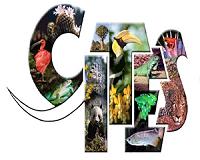| . |  |
. |
United Nations, N.Y. (UPI) Mar 25, 2009 Gorillas could disappear from much of Africa's Congo River Basin within 15 years without urgent action to protect them, a United Nations and police report says. "Illegal logging, mining, charcoal production and increased demand for bush meat, of which an increasing proportion is ape meat," are killing off gorillas, the largest of the living primates, the U.N. Environment Program and International Criminal Police Organization, or Interpol, report said. Christian Nellemann, a U.N. Environment Program senior officer who led the report, said, "With the current and accelerated rate of poaching for bush meat and habitat loss, the gorillas of the Greater Congo Basin may now disappear from most of their present range within 10 to 15 years." Projections in 2002 that only 10 percent of the original gorilla ranges would remain by 2030 "were too optimistic" given intense illegal habitat destruction and poaching of the ground-dwelling plant-eaters that live in central Africa's forests, the report said. Outbreaks of the Ebola hemorrhagic fever virus are adding to concerns, it said. "These epidemics have killed thousands of great apes, including gorillas, and by some estimates up to 90 percent of animals infected by the virus will die." Militias in the Democratic Republic of Congo are behind much of the illegal gorilla trade, worth an estimated several hundred million dollars a year, the report said. Buyers of poached gorillas are "in Asia and beyond," it said. "This is a tragedy for the great apes and one also for countless other species being impacted by this intensifying and all-too-often illegal trade," U.N. Environment Program Executive Director Achim Steiner said in a statement. "Ultimately it is also a tragedy for the people living in the communities and countries concerned," he said.
Share This Article With Planet Earth
Related Links Darwin Today At TerraDaily.com
 Sharks, elephants to reappear on CITES agenda
Sharks, elephants to reappear on CITES agendaDoha (AFP) March 24, 2010 Decisions to tighten or relax trade protection for elephants in Zambia and two species of sharks prized for their fins or meat could be overturned on the last day of a key UN wildlife meeting on Thursday. The final plenary session of the Convention on the International Trade in Endangered Species (CITES) validates decisions taken over the previous 12 days, but a motion to reopen debate suppo ... read more |
|
| The content herein, unless otherwise known to be public domain, are Copyright 1995-2010 - SpaceDaily. AFP and UPI Wire Stories are copyright Agence France-Presse and United Press International. ESA Portal Reports are copyright European Space Agency. All NASA sourced material is public domain. Additional copyrights may apply in whole or part to other bona fide parties. Advertising does not imply endorsement,agreement or approval of any opinions, statements or information provided by SpaceDaily on any Web page published or hosted by SpaceDaily. Privacy Statement |